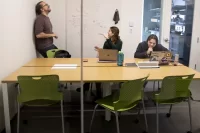
The nearly 200 educators from across the country who gathered this week at Bates College for the Gordon Research Conference came to share new research on ways to make biology education more inclusive, diverse, and accessible in a setting aimed at fostering intense and intimate collaboration.
After just one day, Bates Assistant Professor of Biology Lori Banks, one of two dozen speakers at the conference, said they were already there: “We’re really feeding off each other. The nerd energy here is at an all-time high right now.”
In all, Bates had three professors contributing at the national conference, which reflects well on the college’s growing reputation for “doing a lot of work now on how we talk about power and privilege across all majors,” said Carrie Diaz Eaton, Bates associate professor of digital and computational studies and one of the conference’s co-chairs.
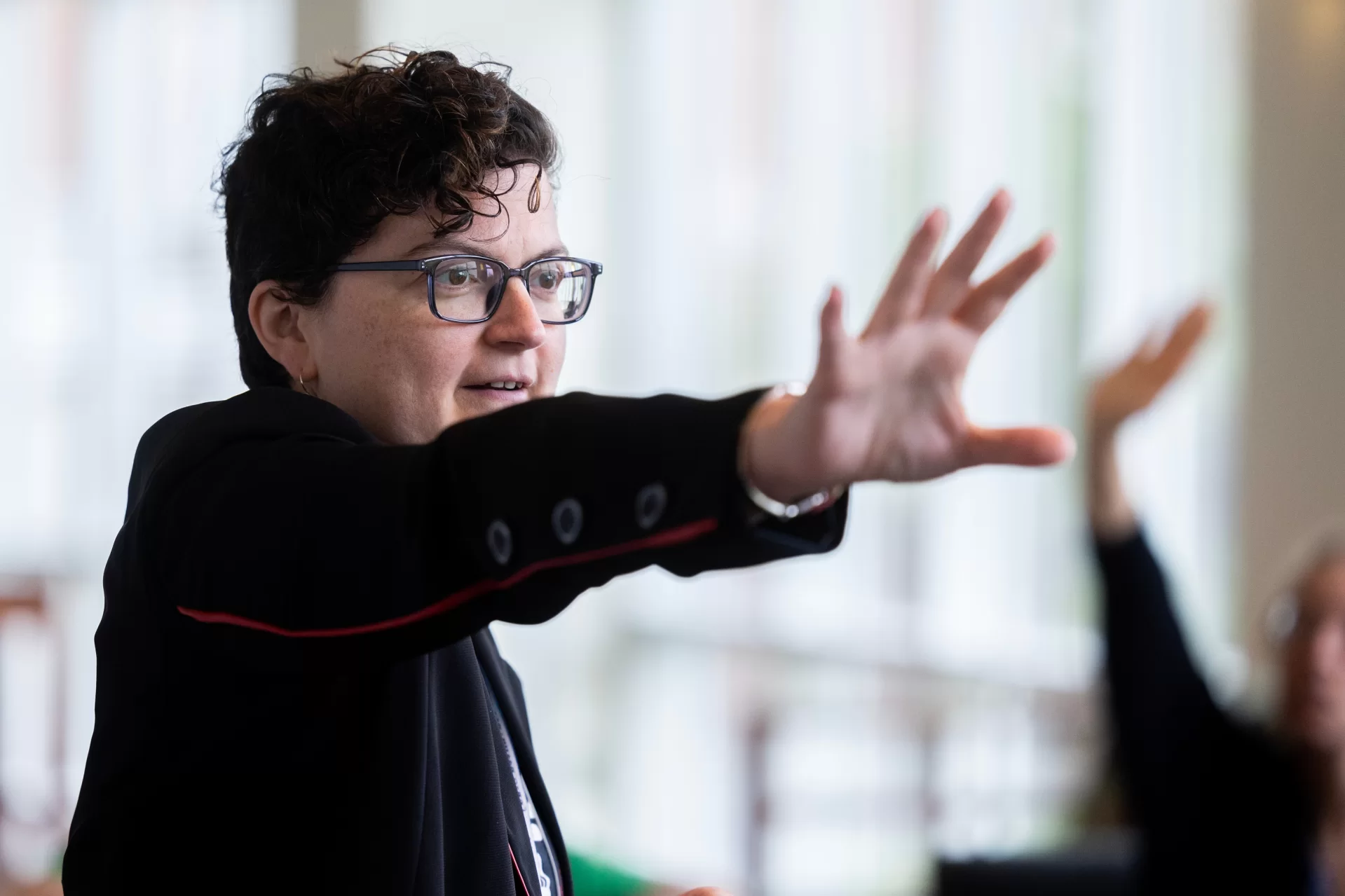
April Hill, who is the college’s Wagener Family Professor of Equity and Inclusion in STEM, also presented at the conference about a Bates team studying ways to make STEM more inclusive, research funded by the Howard Hughes Medical Institute. Hill’s talk focused on course and curriculum reform across STEM disciplines and how equity and justice can be used as guiding principles.
Offered at Bates and 19 venues in North America, Europe, and Asia, Gordon conferences are regarded as premier scientific gatherings.
“We are very proud of our faculty contributing to a gathering of some of the best educators in the world as the community explores ways to promote excellence in undergraduate biology education through social justice,” said Malcolm Hill, Bates vice president for academic affairs and dean of the faculty. “It is a point of pride to host the conference at Bates, and even more so to have these fantastic colleagues as part of our community.”
This summer, Bates will play host to seven Gordon conferences on a dazzling array of topics, such as chronobiology, cerebellum, and photochemistry, in addition to undergraduate biology education, which has been offered at Bates twice before since being added to the GRC roster in 2015 as a biennial conference.
As co-chair of this year’s edition, Diaz Eaton aimed to gather at the GRC a wide range of experts on the subject — specifically researchers from marginalized communities.
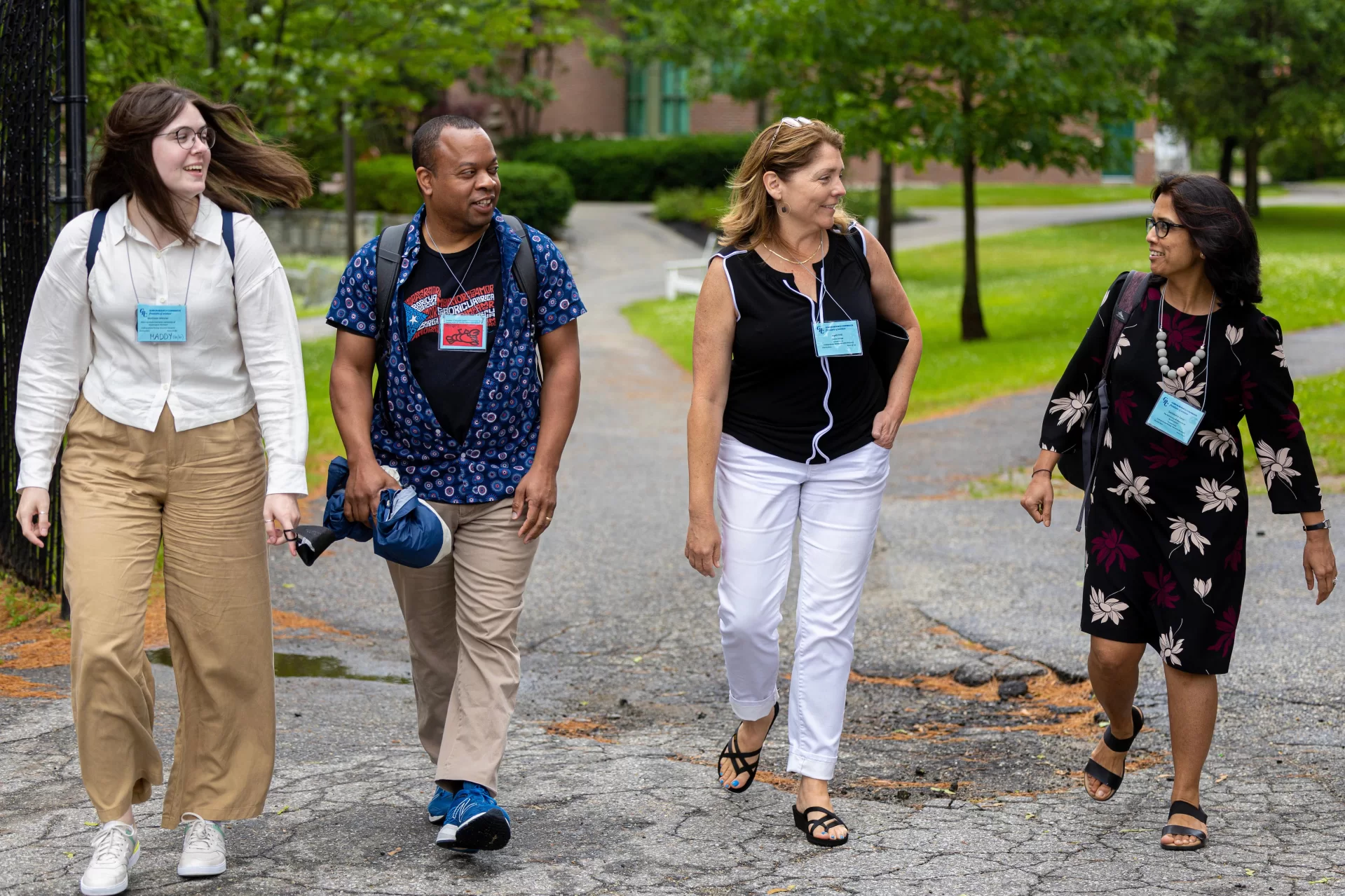
“I really want to see and oftentimes use the voices of the people who have been marginalized in STEM education and oppressed historically, and challenge the community to start new conversations,” Diaz Eaton said.
“The folks we invited to be on stage are its own kind of display of voices that matter. There are a variety of individuals here sharing research and practice also grounded in their social identities and experiences that we wanted to make sure are lifted up in the conversation.”
The goal of the five-day conference — one of seven held by GRC around the world this year — was to challenge the 185 participants to critique themselves as well as their colleagues as they sought new ways to teach biology more inclusively, said Stanley Lo, a lecturer at the University of California San Diego and Diaz Eaton’s fellow co-chair.
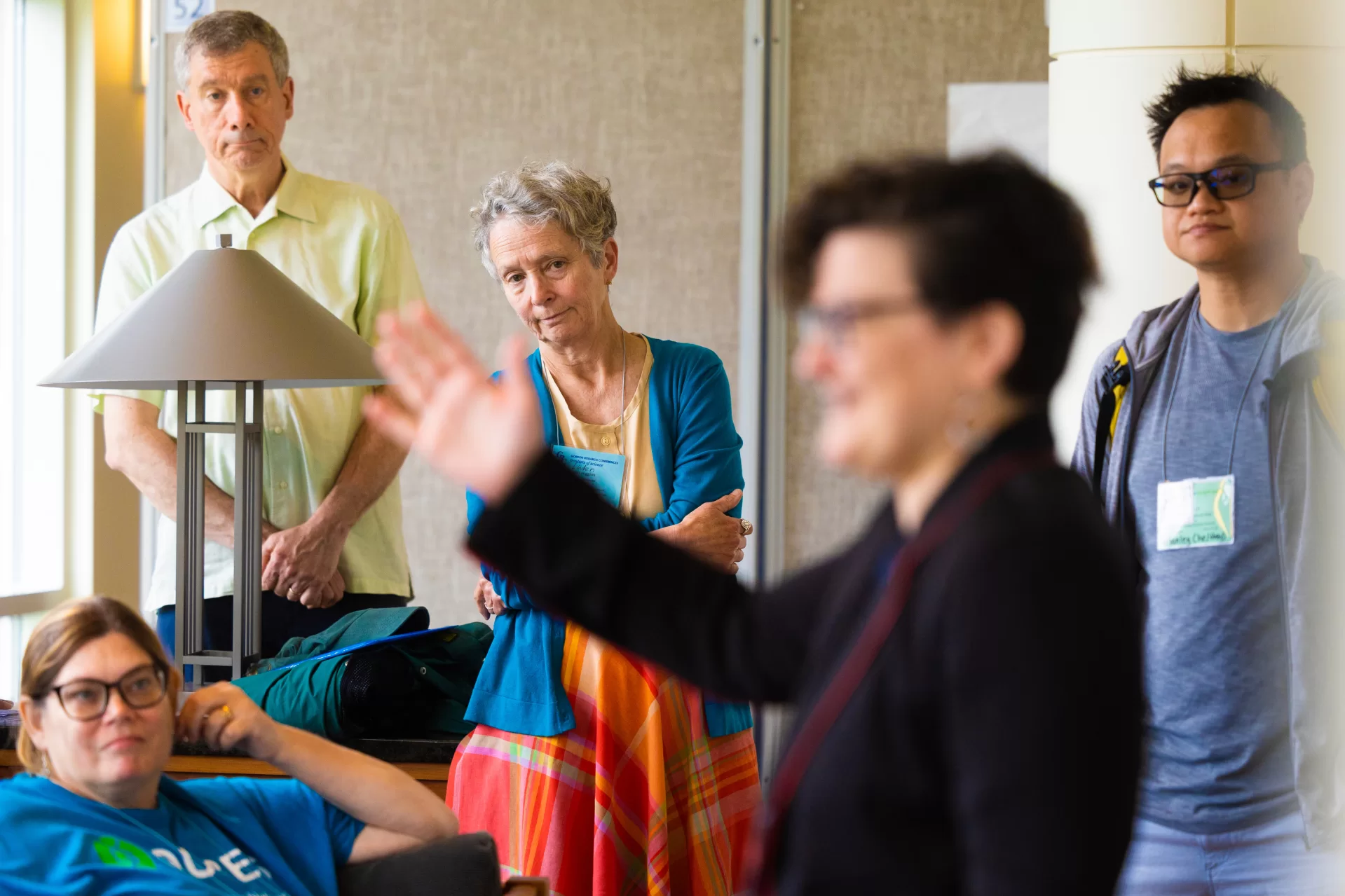
The conference featured two dozen speakers who presented unpublished research in seminars that ran into the night. Afternoon sessions in Perry Atrium resulted in informal small-group discussions about new research that was shared by participants on posters. Yellow and pink sticky notes on the posters provided feedback from educators from as far away as Utah, Arizona, Oregon, and California.
The fact that many of the symposium’s speakers were members of the marginalized groups they studied made their research more authentic and compelling, said Sam Long, a high school biology teacher and transgender man who came from Denver to speak about gender-inclusive education.
Long helped to found a group called Gender Inclusive Biology, a trio of trans and non-binary high school and middle school biology teachers who train educators to be more inclusive in representing gender, sex and sexuality. He relished the opportunity to collaborate and network with others studying equality in STEM — as well as the chance to speak about his own work.
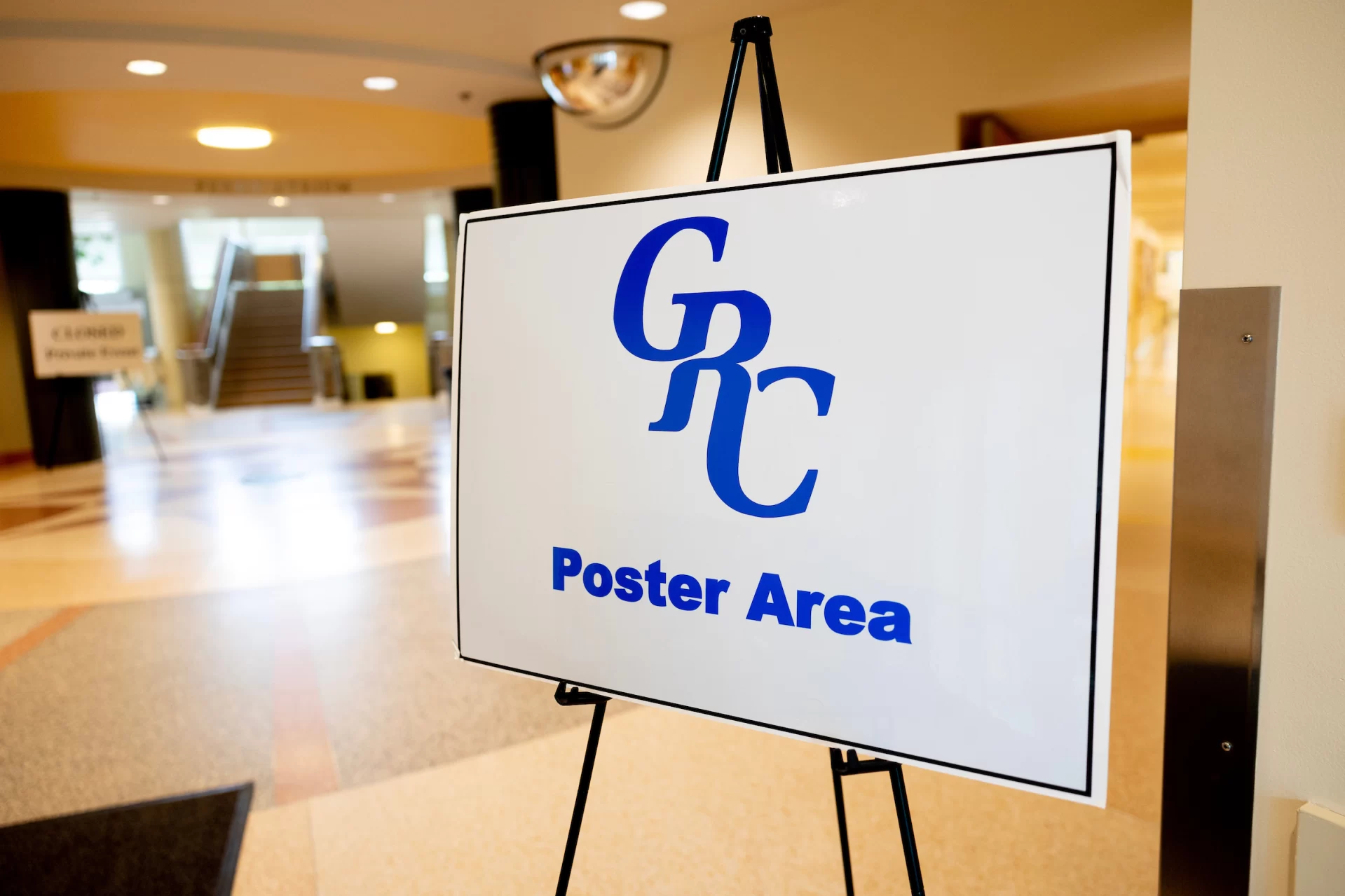
Long is also a wheelchair user, and so he faces a number of barriers to access and inclusion in society.
“If I were to teach my students that people with XX chromosomes are women and people with X and Y chromosomes are men, that is oversimplified,” Long said. “They already know that doesn’t represent me, let alone all the students in our school or people in our community. Why not give the best science education and teach the complex truth about biology?”
“If students don’t feel well respected in the classroom, they don’t persist in science, and that’s not what we need.”
Lori Banks
Banks said the research shared on the first day of the conference helped her think more critically about how to teach biology in a more inclusive way. She pointed to several unpublished studies that looked specifically at the LGBTQ+ experience and how teachers are serving or not serving that community as examples.
“It’s nice to see the data so we can think about how to update our practices,” Banks said. “I think the biggest thing I’ve seen on a couple of different posters is just the language that we use in classrooms and about creative ways in which we can be more inclusive. If students don’t feel well respected in the classroom, they don’t persist in science, and that’s not what we need.”
As Perry Atrium buzzed late Monday afternoon with educators and scholars sharing ideas, Banks spoke with several colleagues about her work focused on STEM identity. One was Hannah Nichols, a doctoral student at the University of Georgia, who was glad to be at this GRC. The mission to make science education more inclusive resonated strongly with her.
“I am a minority in my classroom. I am a Black woman and there are not many Black women in my class — or on my campus, for that matter,” Nichols said. “At the University of Georgia, you’d be very surprised, there aren’t that many. This has made me think about what is going on in my school and in my classrooms.”
![Associate Professor of Digital and Computational Studies Carrie Diaz Eaton teaches (in Carnegie 226) her course DCS 105. Calling Bull in a Digital World.Our world is rife with misinformation. This course is designed to hone digital citizenship skills. It is about "calling b***s*** ": spotting, dissecting, and publicly refuting false claims and inferences based on quantitative, statistical, and computational analysis of data (with R). Students explore case studies in policy and science; possible examples include food stamps, caffeine, improving traffic, and gendered mortality rates. Students practice visualizing data; interpreting scientific claims; and spotting misinformation, fake news, causal fallacies, and statistical traps. In so doing, the course offers an introduction to programming. New course beginning Winter 2019. Enrollment limited to 29. [Q] C. Diaz Eaton.](https://www.bates.edu/news/files/2020/04/190320_Carrie_Eaton-Diaz_Class_0535-200x133.jpg)



